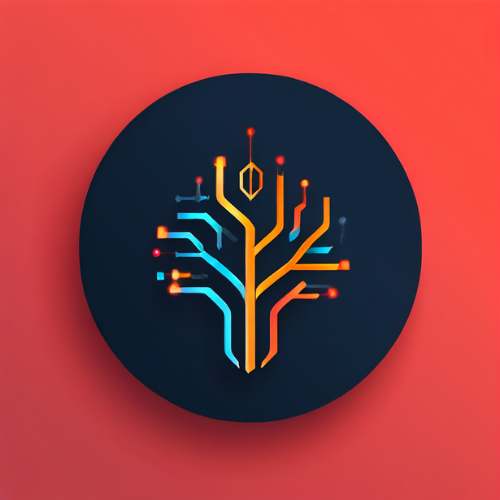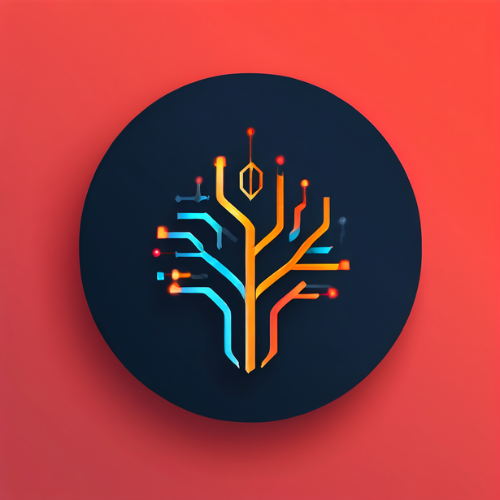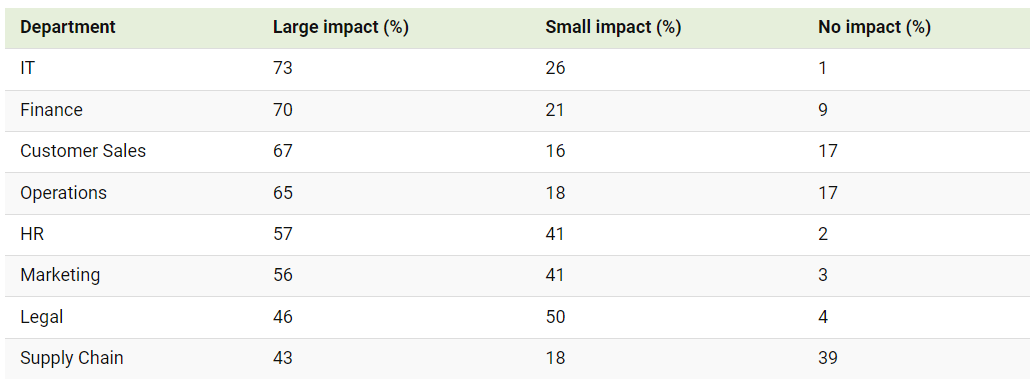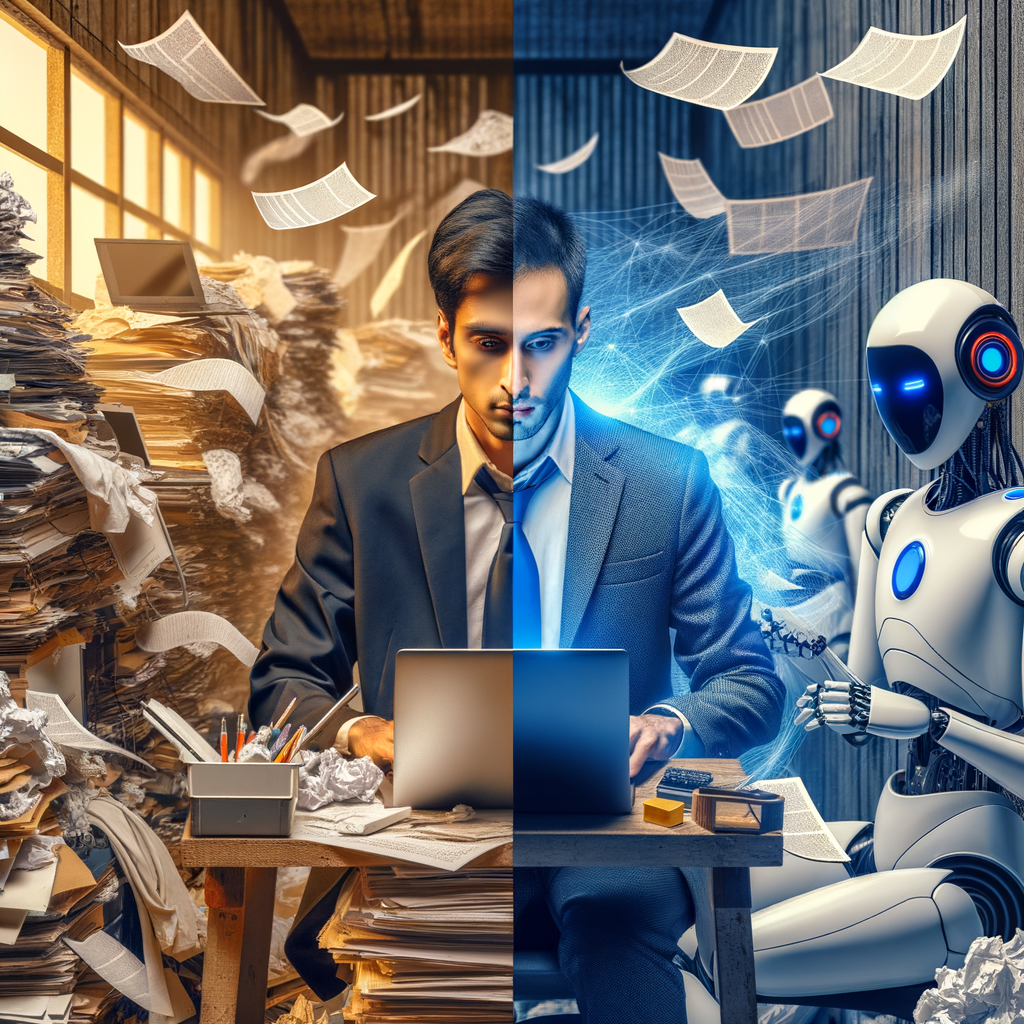Thank you! Your submission has been received


The transformation that AI is bringing to the workplace is substantial, but it's happening sequentially, not all at once. As organizations rush to replace humans with machines, we must be cautious of the potential risks and ensure that we're adopting AI responsibly. As a tech optimist and a father who wants to leave a better world for future generations, I believe that if we work together, we can create systems that ensure a positive co-existence between AI and humans.
Some of us are already witnessing changes in our jobs, whether it's through the automation of simple tasks like responding to emails or summarizing key points in a PDF file or the development of new programs and responding to customer inquiries. The applications of AI are vast and wide-reaching; however, there are many aspects to consider before concluding that you will be out of a job in a few months. Not only is this technology introducing changes to every job in small percentages (rather than replacing full jobs in one go), but organizations and governments are also not ready for it. The latter is struggling to come up with regulations for the industry and will likely enact legislation that could slow down its development rather than help its proper growth. Leaving governments aside, companies face other challenges. Implementing AI in organizations is not as simple as creating ChatGPT accounts for your employees and moving forward. It involves reviewing your data strategy, data governance, cybersecurity systems (and policies), industry compliance, and more. Simply focusing on cleaning up their data, establishing a proper data governance structure, and rolling out DLP (Data Loss Prevention) solutions will take months, if not years.
While current times demand that organizations be more agile, I dare say that most are not. Will they fall behind their competitors? In some cases, yes, but this will depend not only on the company but also on the industry and the jurisdiction in which they operate. This doesn't mean that we have nothing to worry about; rather, it means that now is the time for us as individuals to take action, get involved, and learn about this technology. Prepare yourselves for what is coming; don't wait for someone else to tell you to do so. There will be changes, and many will fall behind, but if we work together, we can likely smooth the impact this transition will have on our lives. Many jobs will disappear, but there will be others that emerge, which we cannot even imagine today.
"Artificial intelligence (AI) is expected to have a significant impact on the future of work by replacing the equivalent of 300 million full-time jobs by 2030, according to a report by Goldman Sachs. AI could replace a quarter of work tasks in the US and Europe, potentially leading to new jobs and a productivity boom. The transformative impact of AI on society will have far-reaching implications on various industries and job types, with some educated white-collar workers earning up to $80,000 a year being the most likely to be affected by automation. AI is projected to bring about additional global economic activity of around $13 trillion by 2030, leading to a 1.2% annual GDP growth. While AI may replace some jobs, it is also expected to create new vocations and help solve complex problems, making our daily lives more convenient. AI is seen as a tool that increases efficiency by managing repetitive tasks, while humans remain key decision-makers in the workplace, with AI serving as an input to augment and assist people in their jobs ."(Five Ways AI Will Change the Future of Work | Hire Waterloo, 2023)
Who will be impacted by AI? The short answer is "all of us"
While the data continues to evolve, the chart below gives you a good idea of what professions are being impacted and how large or small is the impact.

Lu, M. (2024, March 19). Charted: The Jobs Most Impacted by AI. Visual Capitalist. https://www.visualcapitalist.com/charted-the-jobs-most-impacted-by-ai/
The vulnerability of cost centre roles to AI disruption
Roles in teams considered cost centres, such as IT, HR, and marketing, are particularly vulnerable to AI disruption. As organizations seek to optimize their operations and reduce expenses, they may view these departments as prime targets for automation. AI-powered systems can handle tasks such as data analysis, candidate screening, and content creation, potentially rendering many positions in these fields obsolete. It is crucial for professionals in these areas to upskill and adapt to the changing landscape to remain valuable contributors to their organizations. Today, we also see a huge disruption in customer service roles. Companies like Google and OpenAI are promoting the use of agents built with their proprietary large language models to replace people in these positions.
Industries most disrupted by AI and current disruptions
AI is expected to significantly impact various sectors, with manufacturing, finance, healthcare, technology, and education among the most disrupted. In manufacturing, AI-driven automation and robotics are optimizing pipelines, implementing predictive maintenance, and developing dynamic pricing models. The financial sector is leveraging AI for risk management and investment strategies, while healthcare is using AI to improve patient care and accelerate research and development. AI is also enabling personalized learning experiences in education.
Currently, industries like customer service, marketing, retail, and automotive are already experiencing AI disruptions. Chatbots and virtual assistants are transforming customer support, while generative AI is revolutionizing marketing campaigns, virtual shopping experiences, and vehicle prototype design and testing.
An example close to home: The future of project management in the age of AI
As a technologist and a Project Manager, I am keenly interested in understanding how AI will transform project management. AI is already making significant strides in generating documentation, schedules, and running thousands of scenarios based on multiple variables. It will increasingly act as a project manager's assistant, expert, and private consultant, providing valuable insights and recommendations to optimize project outcomes.
However, the importance of human project managers working alongside AI cannot be understated. They will play a crucial role in ensuring successful project outcomes and providing the necessary oversight. While AI can automate many tasks and provide data-driven insights, human project managers bring critical skills such as emotional intelligence, strategic thinking, and stakeholder management to the table.
In the future, I predict that AI will become an integral part of project management, augmenting human capabilities and enabling more efficient and effective project delivery. Some potential developments include:
Predictive project planning: AI algorithms will analyze vast amounts of historical project data to predict potential risks, resource requirements, and optimal timelines, helping project managers create more accurate and realistic project plans.
Real-time project monitoring: AI-powered tools will continuously monitor project progress, identifying deviations from the plan and suggesting corrective actions to keep the project on track.
Intelligent resource allocation: AI will optimize resource allocation based on skill sets, availability, and past performance, ensuring that the right people are assigned to the right tasks at the right time.
Enhanced communication and collaboration: AI-powered virtual assistants will facilitate seamless communication and collaboration among project team members, stakeholders, and clients, reducing misunderstandings and improving overall project efficiency.
Continuous improvement: AI will analyze project performance data to identify areas for improvement, providing recommendations for process optimization and best practices to enhance future project outcomes.
While AI will undoubtedly transform project management, it is essential to strike the right balance between leveraging AI capabilities and maintaining human oversight and decision-making. Project managers will need to develop new skills, such as data literacy and AI management, to effectively harness the power of AI in their roles.
Is there any hope? What jobs could emerge?
.jpg)
There will certainly be new jobs that will emerge, but we are not sure which ones. At first glance, one can see a new category of roles around AI emerging, not so much on the development of AI (for which there will be a high demand), but around the governance and maintenance of AI. These jobs could entail areas such AI governance, AI compliance and alignment, AI ethics, etc. However, I also foresee an evolution of current roles to embrace AI. I would not be surprised to see roles such as AI marketing strategist, AI Project Managers (or Super PMs as called them in my previous blog), AI Automation and Agents developers, Lawyers in AI, etc. Clearly, the evolution of these roles will mean the elimination of jobs that work alongside these individuals as they get replaced by AI (For example, AI Project Managers or Super PMs might work on their own without Project Coordinators or Project Administrators). Positions that some experts believe will emerge include AI Governance Executive, Chief AI Officer, Data Driven Fitness Coach, Predictive Maintenance Engineer, Avatar Psychologist, AI personality designer, AI security engineer, AI-assisted visual merchandiser, AI operator, AI trainer, AI data engineer, and many more.
Expert, P. A. D. S. E. C. A. B. D. M. (2023, May 17). 21 New Jobs That Will Emerge From The Rise Of AI. https://www.linkedin.com/pulse/21-new-jobs-emerge-from-rise-ai-praveen-rastogi
I recommend that you do your own research, and if there is anything that interests you, go for it and make it your own.
Conclusion
The future of work in the age of AI is both exciting and challenging. As we embrace the potential of AI, we must remain vigilant about its risks and adopt it responsibly. By working together and leveraging technologies like blockchain, we can create a future where machines help us rediscover the joys of human interaction while they handle the day-to-day tasks and guide us towards new frontiers. I encourage you to share your own experiences and thoughts on this topic, as fostering meaningful discussions is crucial in shaping the future of work in the age of AI.
As we navigate the future of work in the age of AI, it's essential to approach it with an open mind and a willingness to adapt. AI is undoubtedly transforming the way we work, automating routine tasks and enhancing decision-making processes. It's expected to impact various industries and jobs, potentially replacing traditional roles with automation and AI technologies. However, this doesn't mean that we should fear AI or resist its adoption. Instead, we should focus on developing the skills that will be in high demand in the AI-driven job market, such as communication, empathy, and creativity. These soft skills will be crucial in complementing AI's capabilities and ensuring that we can work alongside it effectively.
While AI may lead to job displacement in certain sectors, it also has the potential to create new opportunities. The key is to stay informed about emerging trends and to continuously upskill and reskill ourselves to remain competitive. As we embrace AI and its potential to shape the future of work, it's important to question its implications and ensure that its adoption is ethical and responsible. We should actively participate in discussions about AI's impact on society and advocate for policies that promote fairness and equality in the workplace.
So, let's approach the future of work with curiosity, adaptability, and a critical eye. By doing so, we can harness the power of AI to create a more efficient, innovative, and inclusive workplace for all.
Resources used to write this post
90 Top AI Jobs in 2024. (n.d.). WhatIs. Retrieved May 12, 2024, from https://www.techtarget.com/whatis/feature/Top-AI-jobs
Amdur, E. (2023, October 5). 14 AI Jobs of the Future – NOW. Forbes. Retrieved May 12, 2024, from https://www.forbes.com/sites/eliamdur/2023/08/24/14-ai-jobs-of-the-future--now/
Bannon, M. T. (2023, June 22). How AI Is Changing the Future of Work. Forbes. Retrieved May 12, 2024, from https://www.forbes.com/sites/marenbannon/2023/06/22/how-ai-is-changing-the-future-of-work/
Five Ways AI Will Change the Future of Work | Hire Waterloo. (2023, November 1). Five ways AI will change the future of work | Hire Waterloo. Retrieved May 12, 2024, from https://uwaterloo.ca/hire/news/five-ways-ai-will-change-future-of-work
“the Impact of Artificial Intelligence on the Job Market: 5 Key Trends.” (n.d.). “The Impact of Artificial Intelligence on the Job Market: Unveiling 5 Key Trends for 2023.” Retrieved May 9, 2024, from https://www.linkedin.com/pulse/impact-artificial-intelligence-job-market-5-key-trends
Jesuthasan, R. (2024, January 21). The Future of Work in the Age of Generative AI: Insights From Davos. Forbes. Retrieved May 9, 2024, from https://www.forbes.com/sites/ravinjesuthasan/2024/01/21/the-future-of-work-in-the-age-of-generative-ai-insights-from-davos/
Panel, E. (2024, February 20). 20 New and Enhanced Roles AI Could Create. Forbes. Retrieved May 12, 2024, from https://www.forbes.com/sites/forbestechcouncil/2023/07/06/20-new-and-enhanced-roles-ai-could-create/
AI Resources used to write this post
Anthropic - Cloude 3 - Opus via https://poe.com for Brainstorming and Writing
Quilbot (https://quilbot.com) for research, spelling, works cited and grammar suggestions
